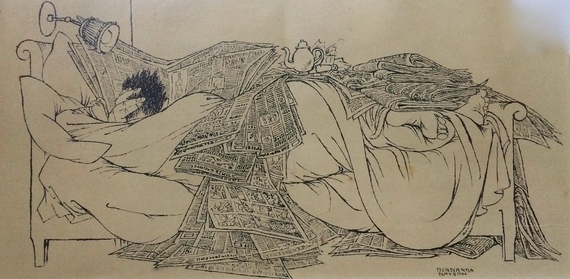
Among the casualties of social networking are those suffering from FOMO, the chronic and debilitating condition of "the fear of missing out" in a world where social activity seemingly takes place in droves, within packs of the elite's synchronized coolness standing on verdantly superior grass. For those of us older than twenty this fear goes largely unrecognized accustomed as we were to a teenage world in which hanging out together meant three of us around a record player and a party comprised maybe ten at someone's house. But social exclusion is a genuine concern for today's youth as it moves en masse, like shoals of fish on the hunt for individuality.
However, in the Information Age FOMO has metastasized into a secondary worry for us of the older age dynamic, and that is the fear that we should be abandoned as waifs of ignorance when it comes to being informed. The accessibility to news and events that we now experience globally has become a need to belong to something bigger, like the teenage party from which the young don't want to be excluded.
Our access to data is immense. Our minds are both bent and numbed by an everyday bombardment of happenings which are conceived, born, executed and analyzed while we make coffee - from Asia's efforts to lead the world, to the Great Green Wall of Senegal's Sahara, alternative energy storage, Neil McGregor and what it means to be German, the psychosis of war at the Tate, Francis's papal pronouncements, the floating gardens of Bangladesh and, heck, Jordan's police camels. Despite the understandable consumption of today's airwaves by terrorism and international conflicts, fascinating happenings proliferate from every corner of the planet.
All that is our news and culture today becomes our nation's history three months later, analyzed with the precision of the Fall of the Roman Empire. Everything feels relevant. Books with titles that reflect a six year old phenomenon now possess an iconic status in the evolution of the western world :"Stress Test: Reflections on Financial Crises", "Hack Attack; How the Truth Caught up with Rupert Murdoch", "Shredded: Inside RBS, the bank that broke Britain".
And our fear of missing out on news has led to practicing a less strenuous strain of FOMO - CG: cursory glancing.
Cursory glancing is a relief from having to read everything that comes our way, a sort of tempering of information through unconscious omission. So we flip through headlines, bylines and first sentences, and we scroll down and sideways, while we use search engines for verification of the issue, the syndrome and the name of the movement. We're grateful for headlines that need no further investigation, read the Tweet without clicking on the link and even welcome a topic that doesn't relate to us at all - we need the break. So the vegetarian flicks through the latest meat-based recipes secretly relieved he/she doesn't have to cook them, while the celiac casually browses the art of baking blind because he/she won't, the Booker Prize enthusiast scans the bestseller nodding with assumption, and the blog follower picks up content through GIFS. Cursory glancing still keeps us in the loop. As for real distraction there's always YouTube as cats chase cars, dogs sing Aretha Franklin and newborns play Rostropovich.
When the length of a book is an exhausting concept and the duration of an article a postponement, the final flourish of flipping over the back page of the newspaper or scrolling to the bottom of a screen is a certainty that we remain in the know, even though the details might be hazy. Information it might be but are we learning anything? Or is knowing close enough to knowledge?
